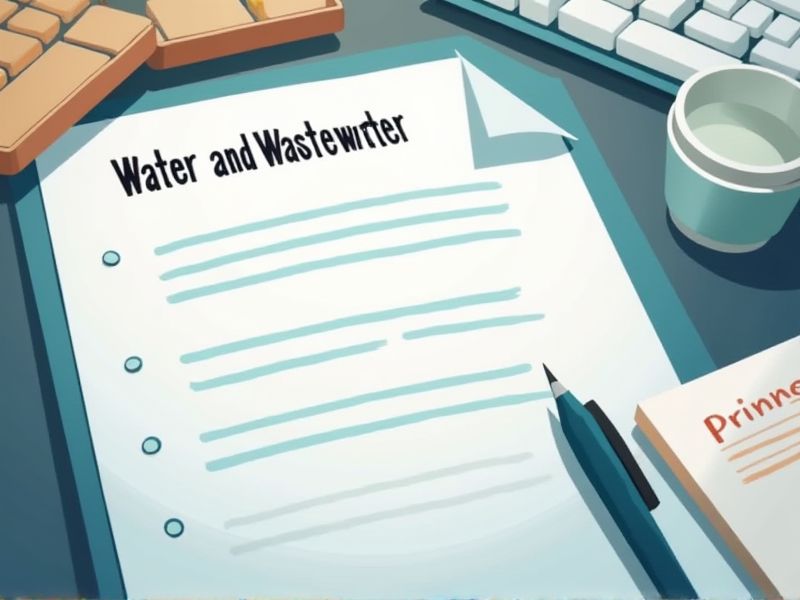
Water and Wastewater Treatment Operators manage complex systems to ensure safe and clean water, necessitating a high level of technical expertise. Regulatory standards and public health requirements demand that operators possess certain certifications to validate their knowledge and skills. Certifications also equip operators with the latest industry practices for efficient and safe operation. Essential certifications for Water and Wastewater Treatment Operators include the following.
Certified Water Treatment Operator (CWTO)
A Certified Water Treatment Operator ensures the safety and quality of drinking water by adhering to regulatory standards. The certification process equips operators with the necessary skills to effectively manage and troubleshoot treatment systems. Water and wastewater operations require precise technical knowledge to prevent contamination and health risks. Having certified professionals reduces potential operational errors and enhances public confidence in water safety.
Certified Wastewater Treatment Operator (CWwTO)
The need for a Certified Wastewater Treatment Operator (CWwTO) stems from strict regulatory compliance requirements to ensure treated water meets environmental and public health standards. These operators possess specialized knowledge to effectively manage complex treatment processes, which involve chemical, physical, and biological techniques. Their expertise minimizes operational risks and potential environmental contamination, safeguarding both community health and ecosystems. Certification also ensures operators remain updated on best practices and technological advancements, enhancing overall treatment efficiency and effectiveness.
Water Distribution System Operator Certification
Certification ensures that operators possess the necessary knowledge and skills to properly manage and maintain water systems, enhancing public health safety. Properly trained operators can reduce system failures and contamination risks. Certification can also lead to compliance with regulatory requirements, avoiding legal and financial penalties. It builds public trust in the quality and safety of water services provided by municipal and private utilities.
Collection System Operator Certification
Collection System Operator Certification ensures that individuals possess the necessary knowledge to safely manage and maintain water and wastewater systems. This certification helps reduce the risks of environmental contamination through proper handling and treatment processes. Operators with certification are better equipped to identify and address system inefficiencies, enhancing overall operational effectiveness. Regulatory compliance is maintained more consistently when operators have validated expertise, ultimately protecting public health and ecosystems.
AWWA Accredited Treatment Plant Operator Certification
Achieving the AWWA Accredited Treatment Plant Operator Certification ensures that operators possess the necessary skills and knowledge to effectively manage and treat water, which directly impacts public health and safety. This certification establishes a standardized level of competence, reducing the likelihood of errors in treatment processes that could lead to harmful contaminants entering the water supply. By certifying operators, facilities enhance their credibility and reliability, fostering public trust and compliance with regulatory standards. Certified operators can adopt and implement the latest industry practices and technologies, promoting operational efficiency and environmental sustainability.
Process Control and Instrumentation Certification
Having a certification in Process Control and Instrumentation ensures operators understand and can effectively manage complex systems for treating water and wastewater. Proper control of these processes prevents harmful pollutants from entering natural water sources, protecting both the environment and public health. Certified operators can reduce operational costs through efficient system management, directly impacting financial sustainability in water management facilities. Certification demonstrates compliance with regulatory standards, contributing to legal and industry accountability.
SCADA Systems Training Certification
Certification in SCADA systems training equips water and wastewater treatment operators with essential skills to effectively monitor and control automated processes. This knowledge increases the efficiency of detecting and addressing potential system malfunctions, minimizing service disruptions. With certified training, operators gain a comprehensive understanding of system analytics, leading to improved decision-making. Certified operators often meet regulatory compliance standards, which can prevent costly fines and enhance public safety.
Hazardous Materials (HazMat) Emergency Response Certification
Hazardous Materials Emergency Response Certification equips water and wastewater treatment operators with the skills to safely handle chemical spills and leaks, minimizing environmental and health risks. Proper certification ensures compliance with legal standards that govern the handling of hazardous materials. Trained operators can effectively implement emergency response plans, preventing contamination of water sources. Certification also improves workplace safety, reducing the likelihood of accidents and protecting both personnel and public health.
Confined Space Entry Certification
Confined Space Entry Certification is necessary because it ensures operators have the skills to safely work in restricted spaces that may contain hazardous gases. Water and wastewater treatment facilities often have tanks and pipelines that require maintenance within confined and potentially dangerous environments. Certification provides the knowledge needed to recognize and mitigate risks, reducing the likelihood of accidents. Regulatory bodies require such certifications to maintain safety standards and protect the health of workers.
OSHA Safety Certification
OSHA Safety Certification is essential for Water and Wastewater Treatment Operators because it ensures they understand and adhere to safety standards necessary to prevent accidents in high-risk environments. Given that chemical handling and heavy machinery are prevalent in these settings, operators are trained to manage these elements safely, significantly reducing injury risks. Compliance with OSHA standards also minimizes the likelihood of costly violations and legal issues for organizations. Certified operators can effectively identify and address workplace hazards, maintaining a safe and efficient work environment.
Summary
When you obtain certifications as a Water and Wastewater Treatment Operator, you increase your value in the job market. This can lead to enhanced career opportunities and potentially higher salary prospects. Certified operators are often entrusted with more responsibilities, improving job security. By demonstrating a commitment to industry standards, you contribute to improved treatment processes and environmental safety.
